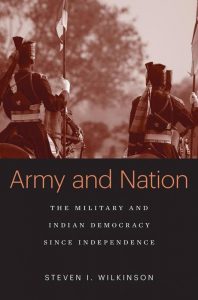
Army and Nation by Steven Wilkinson is an important book that clarifies the tragetory India’s armed forces took vis-a-vis that of the Pakistan.
Wilkinson addresses how Indian founding leaders systematically nullified the democracy destabilizing potential of the Indian Army. This they did by modifying key tenets of the Royal British Indian army that based organization of army units according to the assumption of existence ‘marital races’ in India.
Because of the Royal British Army’s belief in the ‘marital races’, the British India army was organized as ‘racial regiments’, and there was a dominance of certain racial groups in the Indian army’s upper echelon.Nehru and Patel quite deftly reorganized it, such that the ‘racial homogeneity’ of the upper echelon was demolished, while the lower strata was maintained in the organizational style of the British Army. Besides, they created buffer units of a series of paramilitary troops to maintain regular security-keeping function. They also removed the unified command system of the Royal army, and prevented coordination of the three units of the military under a single command. All this ‘softened’ the Indian army and made it subordinate to the civilian authority. In Pakistan, on the contrary, none of these measures were instituted, and in a matter of few years, democracy was sabotages by the military in favour of military autocracy.
We can understand the significance of these moves by Indian founding fathers only when we realize that India is one of the very few countries that could sustain a democratic regimen of the tens of nations that got decolonized in Asia and Africa after the world war. The real significance of India’s achievement can be understood only when you do a counterfactual reasoning of these critical actions of our founding leaders. Just to ask what would have been the fate of Indian democracy had Patel and Nehru didn’t tame the political ambitions of Indian miltary leaders? Army and Nation provide a clear perspective on the issue.
Hits: 2821

